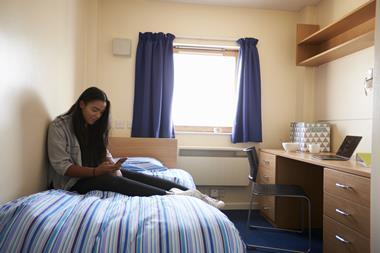The use of technology in real estate has come a long way in the past few years - so far, in fact, that the line between technology and real estate is beginning to blur, according to Roelof Opperman, managing director of real estate at Fifth Wall.

“The biggest REITs in the US right now are data centres,” he said. “All those data centre companies were considered tech companies five years ago, and now they’re considered real estate companies.”
For Opperman, the impact of new technology of course extends much further than high-tech warehouses that house the world wide web.
You can listen to this podcast via Apple Podcasts or Spotify or SoundCloud or listen to it through the player below:
“I think what is truly key is, ‘how is tech creating these new operating models that are going to be the future real estate players of the world?’
“And how is technology enabling, in a sense, new asset classes that could be there, whether it be data centres, whether it be bio [biomedical properties], whether it be single-family home rental, which is now a huge asset class in the US and potentially will be a big asset class in Europe.”
Europe is currently lagging behind the US in fully embracing the use of technology in real estate but this hasn’t held the Los Angeles-based firm back from seeking to raise $118 million to invest in European proptech startups.
Having invested in some of the largest property businesses in the US and UK, how does Opperman go about trying to pick winners?
Opperman said: “It’s actually pretty simple. It’s exactly what we did in the US, but now applied to Europe. We are out there looking for the latest and greatest entrepreneurs, to invest in them, and then partner them with our European ecosystem partners.”

Opperman highlighted that Fifth Wall’s underwriting process comes down to three key components: “an entrepreneur with high integrity, a lot of guts and a great vision”, a business that’s part of a “big, fast-growing market” and a product that solves a problem in that market, and crucially, that users are willing to pay for.
“Then there is a fourth thing for us: how can we influence the outcome via the partnerships we create?”
Low interest rates are certainly helping the investment in technology from real estate companies, Opperman explained.
“It’s also down to the incredible solutions that people are [investing] into, and this incredible entrepreneurial time we are in. And I think that we should all view that as very positive for the future.”
As in many areas of life, the Covid-19 pandemic has accelerated pre-existing trends towards greater use of technology, Opperman said, highlighting the experience of its residential-focussed company Notarize.
“It helps with virtual notarizations for things like mortgage documents,” he explained. “So, instead of having the notarization agent there physically, you just do it via a video phone call. That has taken off with Covid-19 because suddenly, everyone is social distancing, everyone’s stuck at home.
“You have those types of areas, particularly within residential, such as virtual viewing software, and Covid-19 has actually been a massive boost and catalyst for them.”
You can listen to this podcast via Apple Podcasts or Spotify or SoundCloud or listen to it through the player above.
This podcast was produced by Blackstock Consulting founder Andrew Teacher and you can Tweet your views at @BlackstockPR or @andrewjteacher





























No comments yet